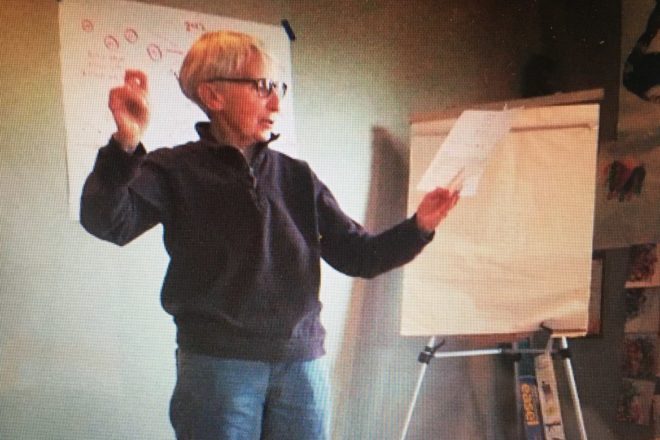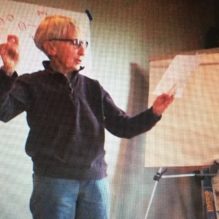Image : Pharr at Southerners on New Ground (SONG) in Atlanta, GA, 2016
Video
Women and the Rightwing Resurgence: A Conversation Between Suzanne Pharr, Loretta Ross, and Mab Segrest
Sponsored by Smith College for International Women’s Day on March 8th, 2022. (1.5h)
Suzanne Pharr—”The Women’s Project: Working Across Race, Gender, and Economics”
Suzanne Pharr tells the story of the Women’s Project’s efforts to build a local women’s movement in the 1980s and 1990s and shows how it worked across race, gender, and economic lines to bring about social change in Arkansas. The discussion includes insights into how these strategies can help confront crises that we now face.
Organizing for Inclusive Democracy
Community Strategic Planning Initiative, Western States Center, Oregon. 2010. (19m)
A panel of Rachel Carroll , Scot Nakagawa, Suzanne Pharr, Tarso Ramos, Eric Ward, and Marcy Westerling discuss the political context and strategies of the Right and successful organizing on the ground, particularly in rural communities.
Liberating Gender and Sexuality Plenary. USSF Social Forum, Atlanta, Georgia
Imani Henry, Betita Martinez, Mia Mingus, Suzanne Pharr, Loretta Ross, Andrea Smith. 2007.
Five speakers discuss a wide range of topics including heteropatriarchy, empire, white supremacy, colonialism, reproductive justice, disability rights, colonization of the body, ableism, feminism, sex, the colonized mind, human rights, movement critique, political prisoners, gentrification, police violence, political prisoners, ICE, war, immigrant rights, Chicana women’s history, domestic workers, anti-capitalism and imperialism.
The text of Suzanne’s Introduction:
We bring to the US Social Forum those who are women, two-spirited, Trans, lesbians, gay men, intersexed, bisexual, queer, gender nonconforming, and questioning.
We honor those just named who have been leaders in every struggle for justice and liberation – often unnamed and unrecognized – and we lift up our voices for those who have been raped, beaten, and killed in war-torn lands at the borders of this country and in sex trafficking and slavery in the streets and in our homes throughout the world.
We lift up our voices for all of us whose bodies have been colonized and exploited for labor, sex, pleasure, money, and war.
Tonight we ask these questions:
Suzanne Pharr interviewed by Kelly Anderson for the Voices of Feminism Oral History Project
Smith College Archives, Smith College. Recorded in Knoxville, TN. 5 Parts (1h per video)
Multi-Issue Politics: Crossing Borders, Building Bridges
Winona State University, Winona, Michigan, 1997. (1h 10m)
An analysis of the Right’s strategies of using an anti-queer attack to link civil rights to special rights, of racializing social issues, and of using race to promote anti-taxation and anti-immigration. A call for the connection of oppressions, the centering of community and building a progressive agenda built on a belief in the human spirit and the equal worth of every person.
Homophobia and the Religious Right
Human Rights Alliance, Santa Fe, New Mexico, 1993. (30m)
The targets of the Right, the use of coded language, the subtext of the attack on the Civil Rights Movement, and the question: “How can we defend ourselves and build a multi-racial, multi-gendered, multi-cultural liberation movement at the same time?”
Homophobia and Democracy
Organized by Mike Perez. Denver, CO, 1992. (1h)
How homophobia and racism are linked by the Right in its strategy to dismantle the gains of the Civil Rights Movement through advancing constitutional amendments. The infrastructure of the Right, its commitment to hierarchy and authoritarianism.
Revolution, Reform, or Transformation
Virginians Against Domestic Violence. 1988. (44m)
Origin and history of the women’s anti-violence movement; fundamentals of organizing for social change; professionalism and service provision vs. social change and movement building; organizing principles; learning from organizing failures; steps toward liberation.
Audio
Speech at the Revolution Will Not Be Funded: Beyond the NonProfit Industrial Complex Conference
Organized by Incite! Women of Color Against Violence. University of California, Santa Barbara. 2004.
How the nonprofit 501c3 has led to professionalization instead of membership-based organizing, competition among organizations, loss of radical analysis and actions, corporate rules and values, service delivery and charity instead of member organizing, addressing declines in membership and base expansion, support of and involvement in capitalism.
Deregulating Women’s Lives and Regulating Greed: An Open Letter to the Conservative Right
This article, written in 1990, is an open letter to the theocratic Right identifying the great contradictions in their politics regarding abortion and urging them to find a higher moral calling. Pharr reads her 1990 essay “Deregulating Women’s and Regulating Greed: An Open Letter to the Conservative Right” from Transformation: Toward a People’ Democracy. (play time 09:09).
Farming Our Politics
In these times when we work so hard and find change so slow I often turn to farming as a metaphor for the long-range vision we have to hold and the respect for and belief in those who make up the grassroots of our work. Pharr reads her 1989 essay “Farming Our Politics” from Transformation: Toward a People’ Democracy. (play time 10:07).
Power Analysis: Youth and Oppression
In a movement that embraces identity politics, why were so many slow to acknowledge youth as critical to the work for justice? Suzanne Pharr reads her 1997 essay “Power Analysis: Youth and Oppression” from Transformation: Toward a People’s Democracy. (play time 18:55).

